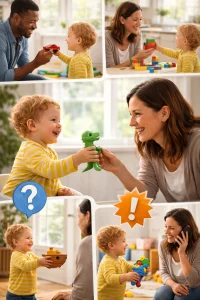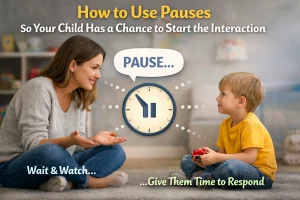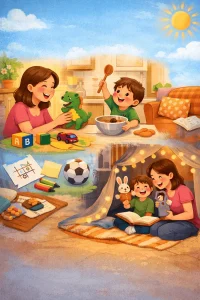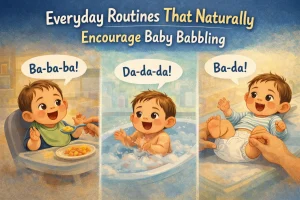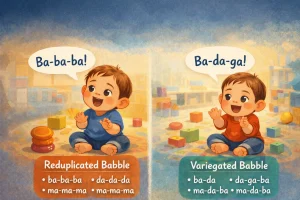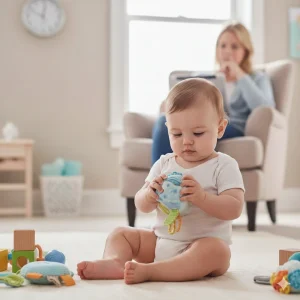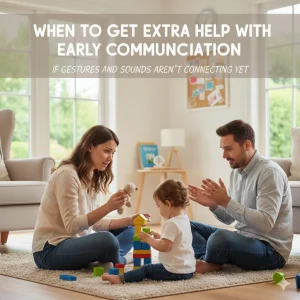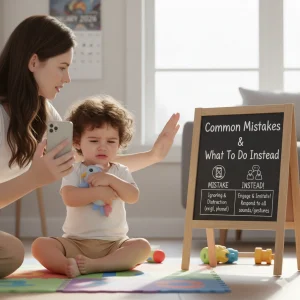Is Your Toddler Only Using Single Words? What to Know
By Rajini D
Last Updated: June 24, 2025
Is your toddler still using only single words like “mama” or “ball”—while other kids seem to be chatting in full sentences?
As a parent, it’s completely normal to feel a mix of confusion and concern. You might be wondering, “Is this just a phase?” or “Should I be worried?”
Here’s the truth: every child develops at their own pace, but there are important speech milestones to watch for—and knowing them can help you take the right steps early.
In this article, we’ll gently walk you through what it might mean if your toddler is still speaking in single words, what’s typical at different ages, signs of possible speech or language delays, and how you can help from home.
Is It Normal for Toddlers to Only Use Single Words?
When Do Toddlers Usually Start Combining Words?
It’s completely normal to wonder if your toddler’s speech is on track—especially when they’re only using single words like “mama,” “ball,” or “milk.”
Most children begin combining two words around 18 to 24 months. You might hear simple phrases like:
- “More juice”
- “Mama come”
- “No bed”
By the time your child turns 2 years old, they should ideally start putting two or more words together to express their thoughts or needs. If your toddler is still using only single words beyond this stage, it doesn’t always mean something is wrong—but it’s a sign to watch more closely.
Some children take a little longer, especially if:
- They are more focused on physical milestones (like walking or climbing)
- They are growing up in a multilingual home
- They are naturally more quiet or observant
But if your toddler isn’t starting to link words by 2 to 2.5 years, it might be time to seek guidance.
How Many Words Should a 2-Year-Old Say?
By their second birthday, most toddlers have a vocabulary of about 50 to 100 words. Some may even have more, depending on how much they’ve been exposed to language and how talkative they naturally are.
Here’s a quick look at typical speech milestones by age 2:
| Age | Milestones |
|---|---|
| 12–15 months | Uses 5–10 simple words |
| 18 months | Has around 20–50 words; understands simple directions |
| 24 months | Uses at least 50 words; starts combining 2-word phrases |
Your child’s vocabulary will grow faster once they start linking words. It’s like opening a door to more learning, better social interaction, and stronger emotional expression.
Why Is My Toddler Only Using Single Words?
If your toddler is still only saying single words while other kids their age seem to be chatting away, it’s natural to feel concerned. You might be wondering—Is my child just taking their time, or is there something more going on?
Let’s look at some of the most common reasons behind this speech pattern.
Common Reasons for Limited Speech
Not all toddlers follow the same timeline when it comes to talking. Some are what we call “late talkers”—children who have strong understanding skills but are slow to speak.
Here are a few possible reasons your toddler might still be using only single words:
- Expressive language delay – Your child understands you but struggles to express thoughts clearly in words.
- Late talker toddler – Some kids simply develop speech later than others but catch up without intervention.
- Hearing issues – Ear infections or mild hearing loss can affect how your child hears and learns new words.
- Less verbal interaction – Children need a lot of back-and-forth conversation and play to build vocabulary.
- Multilingual household – Exposure to multiple languages can temporarily slow spoken word use.
Read More: Is My Child Talking Late? Expressive vs. Receptive Delays
Signs Your Toddler Might Have a Speech Delay
It’s easy to wonder how much is too little when it comes to toddler speech. While every child is different, certain red flags can help you know when to reach out for help.
Look out for these signs of a possible speech delay:
- Not using at least 50 words by age 2
- Rarely combining two words like “want toy” or “go park”
- Not repeating or copying words you say
- Struggling to name familiar objects or people
- Not showing frustration when misunderstood (a sign they’re not trying much to communicate)
- Only using gestures or grunts instead of trying to talk
Could It Be Autism or Just a Speech Delay?
One question many parents ask is: Is my toddler’s speech delay a sign of autism, or is it something else?
Here’s a helpful comparison:
| Speech Delay Only | Possible Autism Signs |
|---|---|
| Child tries to communicate non-verbally | Limited eye contact or lack of social interest |
| Strong understanding of language | Doesn’t respond to name or simple directions |
| Curious, playful, enjoys interaction | Prefers to play alone, shows repetitive behaviors |
| Enjoys pointing, showing, sharing things | Doesn’t point or show interest in sharing attention |
A child with only speech delay will usually show interest in others and respond socially—even if they’re behind in talking. Autism, on the other hand, often includes challenges with social interaction and behavior along with delayed speech.
What Happens If My Toddler Doesn’t Start Talking in Phrases?
By age two, most toddlers begin combining words into short phrases like “want toy” or “go park.” If your child is still speaking in single words and not making the leap to phrases, you might be wondering—what does this mean for their development?
Let’s break it down.
Impact on Social and Learning Skills
When toddlers experience a communication delay, it can affect more than just talking. Speech is closely connected to how children learn, play, and connect with others.
Here’s how limited speech can impact daily life:
- Social interaction – It becomes harder for your toddler to make friends or express feelings like joy, frustration, or curiosity.
- Learning and understanding – Language is the foundation for learning. A child who struggles with words may also struggle to follow instructions or absorb new ideas.
- Behavior – Toddlers who can’t express themselves often show their frustration through tantrums or withdrawal.
- Parent-child bonding – It can be stressful when your child can’t tell you what they need or how they feel.
When to Worry About Your Toddler’s Speech Development
It’s normal to worry—but also important to know what’s within the typical range and when to take action.
Here’s a helpful guide to know when it might be time to seek help:
| Age | Speech Expectations | When to Worry |
|---|---|---|
| 18 months | 10–20 words, uses gestures and follows simple commands | No clear words, poor eye contact, little interaction |
| 24 months | 50+ words, starts combining 2-word phrases | Not combining words, struggles to name objects |
| 30 months | 100+ words, 2–3 word phrases regularly used | Still mostly using single words |
| 3 years | Speaks in simple sentences, mostly understood by others | Hard to understand, short or broken phrases only |
Ask yourself:
- Does my child try to express needs with words or just point and cry?
- Do they seem to understand what I say?
- Are they making progress month to month?
How You Can Help Your Toddler Talk More at Home
If your toddler is still mostly using single words, the good news is—there’s so much you can do at home to help them grow their language skills. And no, it doesn’t require any special training. Just everyday moments, made more intentional.
Fun Daily Activities to Boost Speech
The best way to encourage speech is through playful, natural interactions. Here are some easy, no-pressure activities to help toddlers talk more:
1. Name Everything
While playing or moving around the house, name items clearly:
“Look! A red ball!”
This builds vocabulary and connects words to real-life things.
2. Use Choice Questions
Instead of asking “What do you want?”, try “Do you want juice or water?”
It encourages your toddler to use words to choose.
3. Sing Together
Simple action songs like “If You’re Happy and You Know It” help with repetition and rhythm—both great for language learning.
4. Pretend Play
Play “kitchen,” “doctor,” or “grocery store” and model conversations like:
“I’m cooking pasta! Want some?”
“Yes!”
These everyday activities become powerful tools to build communication—especially when done consistently and with joy.
Talk, Read, Repeat – Simple Parenting Tips
One of the most powerful things you can do is simply talk more. But don’t worry—you don’t have to be perfect. Just be present and interactive.
Here are a few tips to keep in mind:
- Narrate your day: “Now I’m washing your hands. The water is warm!”
- Repeat and expand: If your child says “dog,” you can say, “Yes! Big dog is barking!”
- Pause and wait: After asking a question, give your child a few seconds to respond.
- Respond with interest: Show them their words matter—even if it’s just “ball” or “go.”
Use of Toys, Books, and Music in Language Building
Toys, books, and music aren’t just entertainment—they’re language tools when used with intention.
Books:
- Choose books with clear images, few words, and strong repetition.
- Encourage pointing, naming, and turning pages together.
Toys:
- Pick open-ended toys like building blocks, dolls, or pretend food.
- Focus on interactive play where you talk about what’s happening.
Music:
- Play nursery rhymes and songs that include actions and repeated words.
- Encourage clapping, singing, or finishing the last word of a familiar line.
When to Seek Help from a Speech Therapist
You’ve been doing your part—talking, reading, playing—but if your toddler is still only using single words, you might be wondering, Is it time to get professional help?
The answer is simple: if you’re worried, it’s always okay to ask.
What Does a Speech Therapy Session Look Like?
Speech therapy for toddlers is nothing like a classroom—it’s more like structured play that’s full of purpose.
A licensed speech-language therapist will gently assess your child’s current language skills, and then create fun, goal-based activities to encourage speech.
Here’s what a typical session might include:
- Interactive play using toys, books, or picture cards
- Modeling words and phrases your toddler can imitate
- Reinforcing communication through gestures, sounds, and spoken words
- Parent coaching so you can continue activities at home
How Early Intervention Can Make a Big Difference
When it comes to speech and language, the earlier you act, the better the outcome.
Children’s brains are most flexible during the toddler years. That means they can learn faster, adapt easier, and build stronger communication skills when they get help early.
Benefits of Early Intervention:
- Builds vocabulary and sentence structure before school begins
- Reduces frustration and tantrums caused by not being understood
- Boosts overall development—thinking, listening, socializing
- Empowers you as a parent with tools that truly help
Red Flags You Shouldn’t Ignore
Every child is different—but there are certain signs that suggest your child may need an evaluation from a speech therapist.
Reach out if your toddler:
- Says fewer than 50 words by age 2
- Is not combining words like “want toy” or “go outside”
- Struggles to follow simple directions
- Doesn’t seem to understand you or respond to their name
- Uses gestures or sounds more than words to communicate
- Shows frustration often due to being misunderstood
How Wellness Hub Supports Children with Speech Delays
Every child deserves the chance to express themselves—and every parent deserves clear guidance on how to help. At Wellness Hub, we make that journey simple, supportive, and personalized.
Whether your toddler is a late talker or showing signs of a language delay, our team is here to help you take confident, meaningful steps forward.
Tailored Speech Therapy Programs – Online and Offline
No two children are the same. That’s why our speech therapy programs are carefully customized based on your child’s age, challenges, and goals.
You can choose:
- At-home online sessions
- Hybrid support for extra flexibility
Every session includes interactive, play-based techniques to build real language skills—step by step.
Parent-Friendly Tele-BASICS – Join from the Comfort of Home
We know your schedule is busy. That’s why we offer Tele-BASICS, our virtual therapy program designed just for young children.
- Live sessions over secure video
- Play-based learning guided by speech therapists
- Parent involvement encouraged every step of the way
- Digital resources and home activities shared after each session
Many families love Tele-BASICS because it brings professional support to your living room—no travel, no stress, just simple and effective learning.
Experienced Therapists Who Understand Late Talkers
Our therapists don’t just “teach talking.” They:
- Understand how to gently support children who are shy or frustrated
- Use research-backed strategies tailored for late talkers and expressive language delay
- Communicate closely with parents so you’re never left guessing
- Track real progress—not just word counts, but confidence, understanding, and connection
Progress Tracking, Goal-Based Plans, and Ongoing Support
From day one, we focus on clarity and growth. You’ll receive:
| What You Get | Why It Helps |
|---|---|
| Personalized speech goals | Clear milestones based on your child’s needs |
| Regular progress updates | Know exactly how your child is improving |
| Easy-to-access therapy dashboard | Track sessions, goals, payments—all in one place |
| Support between sessions | Message us anytime with questions or concerns |
We believe parent empowerment is key. That’s why we work as a team—with you, your child, and your therapist all aligned toward the same goal.
Conclusion
If your toddler is still using only single words, don’t worry—you’re not alone. Some kids just need a little extra help to start talking in phrases. Early support makes a big difference in speech, learning, and confidence. At Wellness Hub, we offer both online and offline speech therapy for toddlers, with fun, friendly sessions you can join from home. Our team will guide you step by step with clear goals and regular updates.
Frequently Asked Questions:
1. Why is my toddler still using single words?
Many toddlers begin by saying single words before moving to short phrases. This can be normal—but if they’re over 2 years old and not combining words, it might be worth checking for speech issues like a late talker or expressive language delay.
2. When should toddlers start combining words?
Most toddlers begin linking two words between 18–24 months. At around 2 to 2.5 years, they typically use simple phrases like “more juice” or “go park.”
3. How many words should my 2-year-old say?
By age 2, most children speak 50–100 words and start combining them. If your toddler has fewer words or isn’t forming phrases, it could suggest a speech delay.
4. Is my toddler a late talker or has a speech delay?
A late talker understands words but speaks later than peers. A speech delay means their vocabulary and sentence use are behind expected milestones and may need early help.
5. Should I be worried if my toddler isn’t talking much?
If your toddler isn’t combining words by 2–2.5 years, shows fewer than 50 words, or has trouble understanding, it’s smart to consider a speech evaluation.
6. How can I help my toddler talk more?
Simple daily activities to help toddlers talk more include naming things, offering word choices, singing songs, and reading aloud. These build language and encourage speech.
7. What happens if my toddler doesn’t start talking in phrases?
A communication delay in toddlers can affect social skills, learning, and behavior. But early guidance can turn things around quickly with right support.
8. When should I see a speech therapist for my toddler?
Seek help if your child has fewer than 50 words by age 2, isn’t putting words together by 30 months, or shows frustration from being misunderstood.
9. What does speech therapy for toddlers involve?
Speech therapy for toddlers is play-based and fun. A therapist uses toys, books, and games to model words and encourage your child, with parent coaching included.
10. How does early intervention help language delay in toddlers?
Early help works best because young children learn fast. It improves vocabulary, confidence, school readiness, and reduces frustration. Acting early sets the stage for strong growth.
About the Author:
Rajini Darugupally
M.Sc., Speech-Language Pathologist (9+ years of experience)
Rajini is a passionate and dedicated Speech-Language Pathologist with over 9+ years of experience, specializing in both developmental speech and language disorders in children and rehabilitation in adults. Driven by a desire to empower each individual to find their voice, Rajini brings a wealth of experience and a warm, genuine approach to therapy. Currently, at Wellness Hub, she thrives in a team environment that values innovation, compassion, and achieving results for their clients.
Book your Free Consultation Today
Parent/Caregiver Info:
Client’s Details:
* Error Message
